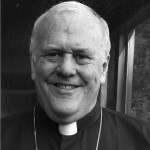GlobalView from Bishop Bill Atwood
If we spend time together, eventually you will come to know that my earliest memory is one of my West Point graduate, General, grandfather carrying me around at about age two. I can remember him whispering into my ear, “Duty, Honor, Country”—the motto of the Military Academy. It was not just when I was tiny that he was around. My father was off for years fighting in the Korean Wars, and my grandfather, having recently retired from the military, was there in my life every day.
We spent a lot of time together, and he would tell me stories about growing up in the “Deep South” of Mississippi. At age 12, when his father died, he dropped out of school and went to work in a saw mill to support his siblings. He worked until they were all through school, and then enrolled in the University of Mississippi. Two years later, he received an appointment to West Point where he graduated in the Class of 1916.
He was in the Horse Artillery during World War I, serving during the famous battle of Chateau Thierry.
He continued to serve, and in World War II was first Chief of Intelligence under General George Patton during the Battle of the Bulge.
In 1965 when the film “Battle of the Bulge” came out, I thought he would enjoy seeing it, so we went together.
During the movie, there is a scene where a German Colonel is handed a box from a captured American prisoner. The Colonel reached inside the box and found chocolate cake that had been sent to the US soldier. “Gentlemen,” the General announced, “We have just lost the war.”
Confused, the other soldiers ask him what he means. “We do not have fuel to move our Panzers (tanks) across the field. The Americans have fuel enough to fly chocolate cake across the ocean. There is no way we can defeat them.”
My grandfather leaned over to me and said, “That actually happened! That was when I was Chief of Intelligence and we got a report back about that very thing from captured German soldiers!” Needless to say, it made the experience of the film special. He served as a Colonel and then later as a General as General Patton’s Chief of Staff. He was even awarded a “Silver Star for gallantry on the field of battle.” Not exactly commonplace for a General officer.
While one could argue that the German officer’s observation was purely one of facts, it appears that it was also a situation in which he lost hope. When hope is gone, we are inconsolable. That is precisely the situation in which many people find themselves in the world today and/or in the Anglican Communion.
In the world, it seems that there is no end to terrorism, dictators, and other horrors. One can derive little consolation from the fact that the horrific images of decapitations and torture are distorted so they will not be so upsetting. It is still obvious what is going on. In the Anglican Church, the structures are so utterly bankrupt that they provide absolutely no hope of being able to turn around the march toward “the abyss!” The great hope of last January’s Primates’ gathering in Canterbury was that the turn-around was finally going to happen. Sadly, the Anglican Consultative Council meeting in Lusaka dashed that hope. Worse than just ignoring the Primates, offending liberals celebrated their rebellion basically saying, “You are not the boss of us!”
Surrounded by these circumstances, we could find ourselves much like the dry bones of Ezekiel 37. Despite the fact that they are coming together in response to Ezekiel’s prophesy, they say, “Son of man, these bones are the whole house of Israel. They indeed say, ‘Our bones are dry, our hope is lost, and we ourselves are cut off!’” Eek 37:11
God commands Ezekiel to continue to prophesy to the bones, to call them to life. They go from unconnected, to connected but lifeless. Then they come alive, but have no hope. Finally, the prophetic word of God gives them not only hope, but also a vision of victory.
So, what are we to do? The prophetic process is already in operation. The Global Fellowship of Confessing Anglicans (GAFCON) has been called by God to be a renewal movement in the Anglican Communion. Rather than being an organizational monolith, GAFCON is a fellowship made up of many theologically like-minded people—from Archbishops to baptized Christians. Leaders have a role, of course, but each of us has a role, too, and we can participate in the prophetic ministry to call the “dry bones” to life. Though we may be short on hope, we need to recognize that God is long on redeeming power. Remember, Ezekiel is calling dead, dry bones to life! The situation of the Anglican Communion, as dire as it is, is not that bad. The Living Word that changes lives is not just proclaimed by the GAFCON Primates, as essential as their participation in that is. Instead, everyone, at every level of the church needs to fulfill their part and call their sphere of influence to life. Do do that, we declare the truth of Who Jesus is and declare the truth of the Scriptures. Like the way radio waves carry voices and music, the transmission medium that carries our prophetic words is love. This is a place where we have fallen short, and where we must do better.
Orthodox people need to make the decision to pay the price to love the people with whom we disagree. I’m not speaking of the vapid vision of love that they demand that only offers affirmation. What we have to do is search our hearts to find ways to commit to actually desiring God’s best for our opponents—even more than we desire victory. While it is possible to pursue victory without love, it is not possible to achieve it.
I have often wondered if Ezekiel’s prophesy to the dry bones was actually, “You are the Body of Christ!” Perhaps not, but we have the insight to be able to offer a prophetic call to the church, saying, “Let me show you a more excellent way!” (1 Cor 12: 31) This is not the anemic stuff that passes for love in our current culture. The culture demands uncritical affirmation. Real love—robust love—tells the truth. It is the truth of a wonderful redemption in the Gospel. It is the life that Jesus Christ has won for us.
In practical terms, what does that mean? We may still engage in addressing false teaching and error in the church, but the tone of what we do needs to be not only clear, but kind. We need to better learn how to say “No”. We need to do our homework and be able to speak cogently to say (for example), “In their attempts to be affirming and loving, the Episcopal Church (TEC) and the Anglican Church of Canada are falling tragically short. Because ‘we see through a glass darkly’ we do not have enough information to innovate on the order that God has established. Attempts to overturn the clear teaching of Scripture miss critical parts of complex situations. Whatever way we move forward must be faithful to Scripture.”
Really loving people has to engage the issue of same-sex unions more than just superficially. For example, though the apocryphal stories describe idyllic committed relationships, the truth is that same-sex relationships exhibit a great deal more infidelity than is found in heterosexual marriage. Some might argue that is due to social stigma, but we just don’t really know. Health issues are a problem as well, with the average American same-sex active male dying many years before the general population. Every person is precious to God. They should be precious to me [and you] as well. I don’t believe it is unloving, however, to say, “I don’t want you to die early!” Even more, I don’t want anyone to miss out on experiencing Christ’s redeeming love.
There are other areas where we need to exercise prophetic calling as well. They include the political arena (which is currently a mess in pretty much every country I can think of!), and dealing with radical Islam. Leaders and everyday Christians need to be calling each other to fidelity. Author Dudley Hall (Stream.org) points out that this kind of prophetic call is not just classical ministry like the Biblical Prophets, but also includes preaching, teaching, and “gossiping the Good News.” Imagine what would happen if literally hundreds of millions of Christians actually spoke up and offered Gospel grace and life in their conversations. Scripture is clear that the Word of God that goes out will not “return void.” Is 55:11 The difference could be staggering.
The point is that we should not be people who live without hope. We should be looking at the events of the world almost as though we are watching the replay of a sports game to which we already know the final score. In fact, that is exactly the case. Jesus is victorious and all those who are in Him will share in that victory through all eternity. That is true no matter what the ACC does, no matter what TEC does, and no matter what the Anglican Church of Canada does. Jesus Christ is risen from the dead, He loves you, and wants to have a relationship with you forever—those other guys, too.
The Rt. Rev. Bill Atwood is Bishop of the ACNA International Diocese and an American Anglican Council contributing author.



